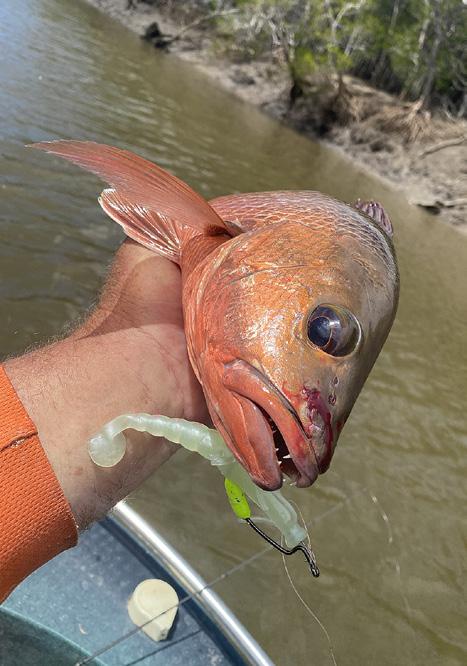
3 minute read
Don’t pack away the barra gear!
Townsville
Dave Hodge
As I write this, there’s no confirmation that the rains from the wet season have finished. It’s been drawn out over a longer period this year, and just when you think things are looking like stabilising in the sizes we’d been hoping for.
Barra are probably the most sought-after river species up here, and conditions have been pretty good for live baiting techniques, but not so much for lure fishing. Tight in amongst cover. the barra have been a bit smaller, and the fish that we have been one of the more consistent places to find a fish, and obviously prawn imitations work well when they’re as thick as they have been. Skipped way up into the back blocks of a drain on a weedless hook and then worked out over the overhanging branches has resulted in some spectacular, though often we’ve found it hard to get a bite in a fishy-looking spot, only to have our luck turn around when we tried changing lures.

I think the surface bite should be a bit better as the water levels stabilise and we get some clarity back in the systems. Night time temperatures and water temperatures are dropping, so we should have that doldrums period coming up soon, when the initial cooler nights make the sleeping weather better than the fishing.
Once things do stabilise, however, and a bit of consistency in the temps becomes the norm, the bite will pick up. Bear in mind that you will have to downsize your lures, and find fish in the deeper holes. If you do this, you should be able to bend a rod regularly. When it comes to finding and catching fish, water temperature is the biggest thing you found in the deeper schools have been reluctant to play our game.
Another issue has been the commercial competition for schooling fish. With the advent of side scan technology, it’s easier for all sectors to find the schools now, and the fish are often taken out before you get that chance to have a go.
This beautifully conditioned barra wouldn’t touch a thing we threw until it was the right colour. On this day, pink was the best by far. and allowing the tributaries to get back to normal heights, another low comes through and gets them up to the high levels again. Combine the runoff with big tides and you’ve got a situation that can be very frustrating and confusing, as the fish often don’t do their normal stuff. Anyway, we have managed to find ‘some’ fish, but not
Small drains have awkward fights. The drain fish have been up to around the 80cm mark, so they can be a handful on the lighter gear.
Don’t be afraid to throw hardbodies, too. My son Tannhym has produced the goods several times when he’s gone to the 3m 90mm Halco Scorpion or Tilsan Barra 80mm and waddled them out of the drains. It’s amazing how should pay attention to. At such times your sounder becomes more important as a thermometer than it is a fish finder.
It can be tempting to stick with the same lures and techniques that always seem to work well for you, but the truth is they’re not always the best choice during the cooler months. This is when we change our tackle, lures, leaders and approach to target cool weather barra. Many an angler gives up entirely and packs the barra gear away, but you can have some good sessions if you stick with it. On the downsized gear we use for much of our winter pursuits, even a 70cm barra can be a handful, and it’s always fun. Here are a few of the soft options that are proven fish catchers for when things slow a little in autumn and winter.


Searching for fish in those upper reaches on the bigger tides and out towards the river mouths on the more neapish tides can quickly narrow the search. If you do find fish in the deeper stretches, depending on the species, try small 3-4” paddle tails and prawn imitations (e.g. Madeye Paddle Prawns, 3” Atomic Prongs, 3.25” Plazo paddle tails). When rigged on appropriate sized and weighted heads, these plastics should get you bending again.
Winter barra outfits more closely resemble jungle perch or bream type tackle for us. What looks like a toy is our most effective tool in winter, as it will throw the smallest of lures that we use in these cooler months. An added advantage of a lighter outfit is that it stops us from straightening the hooks on these lighter rigs, and forces us to let the fish run and tire. We employ the ‘gently gently’ approach for a few months.
We aren’t as focussed on big barra as many anglers around here, but during the cooler months we actually catch at least as many medium sized fish, with the odd metre fish thrown in as when it’s considered prime time.
Bycatch is always going to vary up here, with grunter and fingermark (golden snapper) getting involved when you least expect it. The likes of pikey bream, archerfish, tarpon, GTs and queenfish can also show up from time to time.
All in all, I really do enjoy this time of year. The days on the water are much more comfortable, and the sun’s heat is more bearable. It’s why the Grey Nomads migrate annually up this end of the country, and who can blame them?
Good luck and stay safe.










